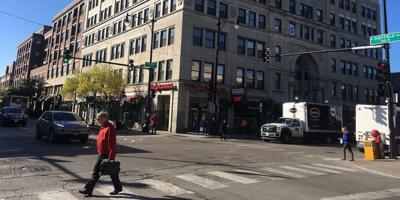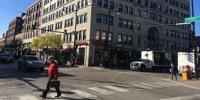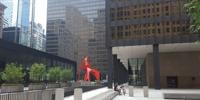
A pedestrian crosses an intersection in Chicago.
CHICAGO - A federal judge has ordered the city of Chicago to install costly new equipment at thousands of intersections across the city to make the intersections safer and more accessible for pedestrians who are blind or have limited vision.
On May 29, U.S. District Judge Elaine E. Bucklo issued an order establishing a so-called "remedial plan" under which the city would be obligated to install "accessible pedestrian signals," or APS devices, at about 71% of the city's signalized intersections in the next 10 years.
APS devices emit sounds and vibrate a tactile button, enabling pedestrians to hear the status of the Walk and Don't Walk signs to know whether it may be safe to cross the street.
The order comes as the latest step to resolve a class action lawsuit brought against the city of Chicago by advocates for the blind.
In 2019, the American Council for the Blind of Metropolitan Chicago, together with attorneys from the Disability Rights Advocates organization and the Proskauer Rose firm, sued the city in federal court. The lawsuit accused the city of discriminating against the blind, in violation of federal disability access laws.
The lawsuit asserted, at the time it was filed in 2019, only 11 out of more than 2,800 signalized intersections in Chicago included such APS devices. The city's 2012 public pedestrian plan, which cited a primary goal of eliminating pedestrian fatalities by 2022, included intent to install APS devices at every new traffic signal starting in 2016. By 2019, only one of 39 newly signalized crossings were equipped with APS, the lawsuit noted.
In 2022, the U.S. Department of Justice under the administration of former President Joe Biden joined in the legal action in support of the American Council for the Blind's claims.
At that time, U.S. District Judge Elaine Bucklo also agreed to allow the lawsuit to proceed as a class action on behalf of as many as 60,000 Chicago residents with limited eyesight.
In 2023, Bucklo again ruled in favor of the plaintiffs, saying there was no debate on whether the city, as a recipient of federal funds, should be held liable for allegedly violating federal disability equal access laws.
Bucklo also rejected the city's attempts to point out no federal law or rule requires APS at intersections. The judge said the absence of such a rule doesn't absolve the city of a duty to provide access to its sidewalks and street crossings.
After two more years of proceedings, Bucklo issued the new order, forcing the city to move ahead with the installation of APS at its intersections.
Under the order, styled as a "remedial plan," the city of Chicago must equip at least 71% of the city's signalized intersections with APS by 2035. All of the remaining signalized intersections must include APS within the next five years, the judge directed.
The order also institutes annual benchmarks with which the city must comply. By the end of May 2026, for instance, the city must install APS at 70 intersections. That annual number will increase to 110 from 2026-2027; 135 the following year; then, 154 in Year 4; 185 in Year 5; 220 in Year 6; 235 in Year 7; and 245 APS installations each year from 2033-2035.
The judge further laid out how the city may prioritize the installations, beginning with intersections for which the city had received requests for APS installation before March 2025.
The city must also prioritize installation at intersections with "particularly dangerous conditions;" those near public transit stops; and those near areas with unusually large pedestrian traffic, such as "major shopping areas, major cultural venues, and educational campuses," among other high priority areas within the city.
A court-appointed independent monitor would oversee the work, according to the order. The monitor would be appointed by agreement between the parties, the judge said.
It is not known how much this may ultimately cost Chicago's taxpayers. However, according to a report published in 2023, New York City incurred a median cost of about $56,000 per intersection to install APS in that city in 2020. Actual cost per intersection ranged from a minimum of $14,000 per intersection to as much as $150,000, depending on the nature of the intersection to be remediated using APS, the New York report said.
When the $56,000 New York City median is multiplied across at least 2,800 intersections, the cost could easily exceed $157 million.
The judge's order also allows attorneys for the American Council for the Blind to secure attorney fees. The order does not specify how much those fees may be. Rather, the judge said the fees could be subject to negotiation between the city and the plaintiffs. Should they fail to reach an agreement, the judge invited the plaintiffs' lawyers to file a fee petition to be reviewed and approved by the court.
The judge's order was hailed by the American Council for the Blind and their attorneys in a statement issued after the order was published.
“We are thrilled with the Court’s Remedial Order, which will completely reshape the pedestrian infrastructure and lead to historic accessibility improvements,” said attorney Rachel Weisberg, of Disability Rights Advocates, in the prepared statement.
“This landmark decision is a win for civil rights, public safety, and equal access. It is a victory for all blind and low vision pedestrians in Chicago and will bring long-overdue systemic change,” said attorney Eddie Young, of Proskauer Rose.
And plaintiff Deborah Watson, of the American Council of the Blind Metropolitan Chicago, added: “I am so pleased that the various victories we have had throughout this case have led to where we are today with a strong remedial order from the court."
According to court records, plaintiffs have been represented in the action by attorneys Nigel F. Telman, Edward Chester Young and Holly Renae Morris, of the firm of Proskauer Rose, of Chicago; and Christina Brandt-Young and Jelena Kolic, of Disability Rights Advocates, of New York and Chicago.
The city was represented by attorneys from the city’s Department of Law; and attorneys John C. Hansberry, Matthew Scot Payne, Laura Elizabeth Caplin and Nathan J. Marketich, of Fox Rothschild, of Pittsburgh, Pennsylvania.




